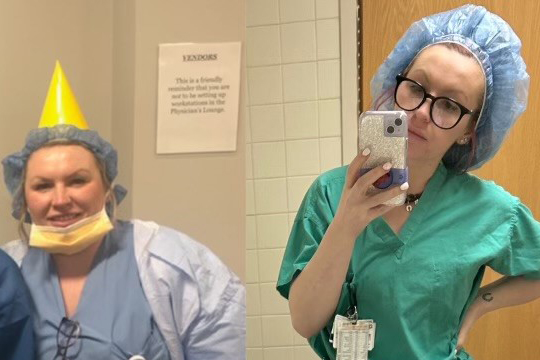My knees don’t hurt, I’m not winded after carrying a bunch of groceries up the stairs. It’s the little things that keep me motivated to maintain my lifestyle.

Ashley Mullins knows just how much weight can impact one’s overall health. As an operating room nurse, she saw firsthand the relationship between a higher BMI and an increased risk for side effects and complications during surgery. In her profession, she is an advocate for her patients leading healthier lives but secretly struggled on her own journey.
Since the birth of her son eleven years ago, Ashley was stuck in a cycle of dieting, losing weight, and gaining it all back. Postpartum weight gain is common for many women and can be difficult to lose. Between juggling single motherhood while working and going to school full time, it was challenging for Ashley to maintain healthy habits. She realized she needed to make a serious lifestyle change when she began experiencing difficulty with everyday tasks such as walking upstairs and standing for long periods of time.
“I felt like I was carrying around 20 bags of 5lb sugar everywhere I went,” said Ashley.
She considered bariatric surgery after an unexpected complication from a sudden procedure resulted in nine months of bed rest. “Going from the gym to being at home, unable to work, or do much of anything because of my injury, made me unmotivated. I was back to square one. I was really upset and became depressed.”
At the time of Ashley’s injury, she weighed 238 lbs and wanted to get healthier. In the following weeks, she had a consultation for a sleeve gastrectomy, a procedure that decreases the size of the stomach, at the Bariatric and Metabolic Center at Robert Wood Johnson University Hospital.
“Based on Ms. Mullins’ history she was an ideal candidate for a sleeve gastrectomy,” says Michael Donaire, MD Bariatric Surgeon at Robert Wood Johnson University Hospital. “the surgery would significantly improve her sleep apnea, fatigue, and overall quality of life.”
A sleeve gastrectomy is recommended for those who have a high BMI, a proven inability to lose weight, or common morbidities such as diabetes, hypertension, sleep apnea, or heart disease. RWJUH’s Bariatric and Metabolic Surgery Center incorporate a number of different specialties to develop a personalized care plan for patients. This care plan includes extensive education and evaluation before surgery, and the lifetime follow-up care and support critical for keeping the weight off and staying healthy.
After years of dieting, bariatric surgery helped Ashley learn how to live a healthy lifestyle that was sustainable for her. Nine months post-operation she lost close to 80 lbs. and saw significant improvements in her sleep apnea and mobility. Today Ashley has lost over 100 lbs. Bariatric surgery is not a quick-fix weight loss solution. Rather, it is a kickstart for those on a journey to a new healthier lifestyle.

“My knees don’t hurt, I’m not winded after carrying a bunch of groceries up the stairs. It’s the little things that keep me motivated to maintain my lifestyle,” said Ashley. “One of the best things is that I can move around with my son now freely and keep up with him. I was able to be the coach for his rec soccer team this past fall and I would get out there with the boys during practices and absolutely beat my son and his friends at a game of soccer. That was the best feeling ever!”
The Bariatric Surgery Program at Robert Wood Johnson University Hospital has received widespread recognition for excellence in care. Honors include the Healthgrades Bariatric Surgery Excellence Award, the Center of Excellence in Metabolic and Bariatric Surgery designation by the Surgical Review Corporation, and the Joint Commission’s Gold Seal of Approval.
For more information visit the Bariatric Surgery Program at Robert Wood Johnson University Hospital.